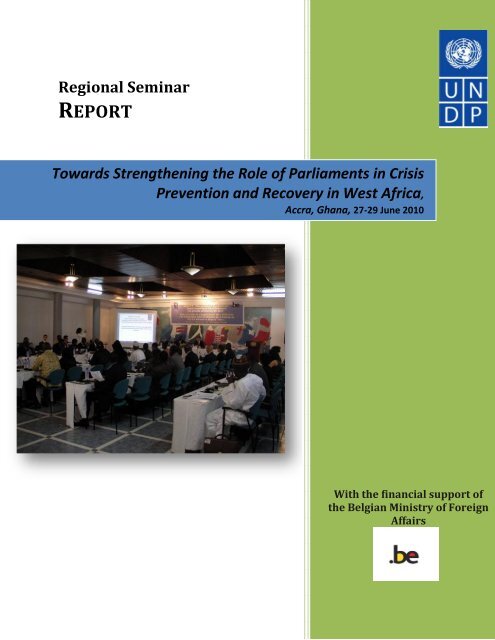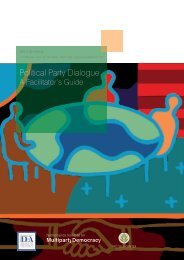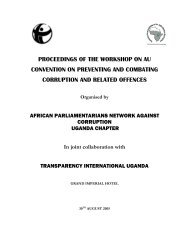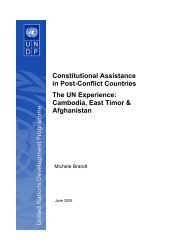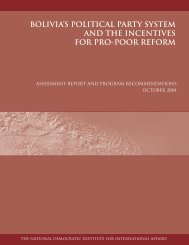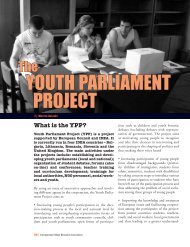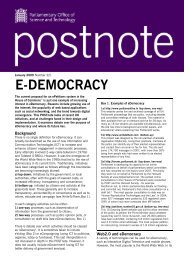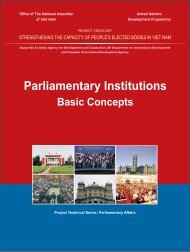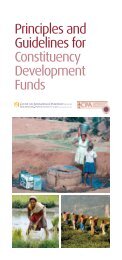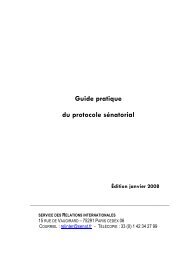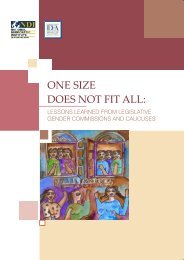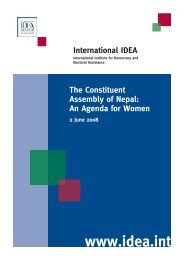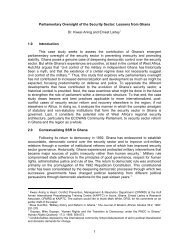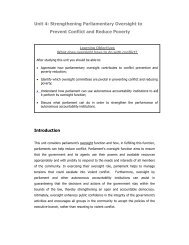here - Agora Portal
here - Agora Portal
here - Agora Portal
- No tags were found...
You also want an ePaper? Increase the reach of your titles
YUMPU automatically turns print PDFs into web optimized ePapers that Google loves.
Regional SeminarREPORTTowards Strengthening the Role of Parliaments in CrisisPrevention and Recovery in West Africa,Accra, Ghana, 27-29 June 2010With the financial support ofthe Belgian Ministry of ForeignAffairs
ACCRONYMS and ABBREVIATIONSAWEPABCPRBDPCBPCEDAWCIDACPRCSOCSPADCAFDGGECECOFEPAECOWARNECOWASFESGBVGPPSIPUJLPPCRCPMSALWSSG/RSWOTUNDPUNRECWAANSAWACSOFWANEPWAPIWARNWIPNETAssociation of European Parliamentarians with AfricaBureau for Crisis Prevention and RecoveryBureau for Development PolicyCapacity Building ProgramConvention for the Elimination of All Forms of DiscriminationAgainst WomenCanadian International Development AgencyCrisis Prevention and RecoveryCivil Society OrganizationsCivil Society Policy and Advocacy ProgramGeneva Centre for the Democratic Control of Armed ForcesDemocratic Governance GroupEuropean CommissionECOWAS Female Parliamentarians AssociationECOWAS Warning and Response NetworkEconomic Community of West African StatesFriedrich-Ebert-StiftungGender-based ViolenceGlobal Programme for Parliamentary StrengtheningInter-Parliamentary UnionJustice Lens ProgramParliamentary CentreRegional Crisis Prevention Mechanism’sSmall Arms and Light WeaponsSecurity Sector Governance / ReformStrengths, Weaknesses, Opportunities and ThreatsUnited Nations Development ProgrammeUnited Nations Regional Centre for Peace and Disarmament inAfricaWest African Action Network on Small ArmsWest African Civil Society ForumWest Africa Network for Peace-buildingWest Africa Peace - building InstituteWest Africa Early Warning and Response NetworkWomen in Peace-building Network3
EXECUTIVE SUMMARYOn the basis of UNDP Guidelines for the International Community on Parliaments, Crisis Preventionand Recovery, the United Nations Development Programme (UNDP) hosted a regional seminar“Towards Strengthening the role of Parliaments in Crisis Prevention and Recovery in West Africa”, inAccra (Ghana) on June 27-29 2010 with 60 participants representing 13 parliaments from t<strong>here</strong>gion 1 , the Economic Community of West African States (ECOWAS) Parliament, key internationaland regional organizations (such as the Inter-Parliamentary Union (IPU), the United Nations RegionalCentre for Peace and Disarmament in Africa (UNREC), The Friedrich-Ebert-Stiftung (FES)), civil societyorganizations (West African Action Network on Small Arms (WAANSA), West Africa Network forPeace-building (WANEP)), and practitioners (European Commission Delegation, CanadianInternational development Agency (CIDA), the Parliamentary Centre (PC), and United NationsDevelopment Programme (UNDP) colleagues ) with the financial support of the Belgian Ministry ofForeign Affairs.The regional seminar provided a unique opportunity to reflect on past and future capacitydevelopment activities in the field of crisis prevention and recovery: what has been successful andthe impact of such activities for parliaments in West Africa. Participants stressed that strengtheningparliaments as a whole institution is a major crisis prevention tool as this allows the parliaments toeffectively play their oversight, legislative and representative functions including on crisis preventionand recovery issues such as the creation of dedicated peace parliamentary committees (Ghana),legislating on gender-based violence in application of UN Resolution 1325 and 1820 (Sierra Leone,Guinea-Bissau, Liberia, Côte d’Ivoire), oversight of the implementation of peace-building orprevention and reconciliation strategies (Togo, Guinea-Bissau), and parliamentarians mediatingwith the rebellion at the local level (Mali).At the regional level, participants recognized the multiplier force of the Economic Community OfWest African States (ECOWAS) Parliament and its capacity to interface with national parliaments oncrisis prevention and recovery issues (particularly during the Niger and Guinea Conakry crisis). TheEconomic Community Of West African States (ECOWAS) Parliaments sits at a critical stage ofevolution with the newly adopted vision 2020 moving from an ECOWAS of States to an ECOWAS ofthe people with the establishment of a single economic region (single currency, single central bank,and a legislative community parliament). Mainstreaming peace and security issues throughout the13 standing ECOWAS committees was highlighted as a way forward. The launch of the ECOWASFemale Parliamentarians Association (ECOFEPA) provides another opportunity to further engage ongender equality and gender-based violence issues in the region.The regional approach was recognized by the parliamentarians as highly relevant as it providedthem with an open space to exchange inspiring good practices and challenges they face onsensitive issues such as personal security concerns, independence of the parliament from theexecutive, corruption when dealing with gender-based violence, independence from political parties’1 Benin, Burkina Faso, Côte d’Ivoire, Republic of Congo, the Gambia, Ghana, Guinea, Guinea-Bissau, Mali,Liberia, Niger, Sierra Leone and Togo.4
positions within the region. This regional approach made parliamentarians less isolated in theiropinions and questions on the role they can play on crisis prevention and recovery issues.At the national level, participants stressed that parliamentary institutions often remain weak inrelation to the executive, armed groups and other non-state actors in post-conflict situations. Asstated in the UNDP guidelines, “building effective democratic governance requires correcting thisimbalance”. The presence of strong and legitimate parliaments is crucial for a greater role in crisisprevention and recovery (e.g. Niger crisis).Participants recommended strengthening the role of parliamentarians in the area of crisis preventionand recovery; by building their mediation and communication capacities to intervene positively in,for example land disputes, border issues and to better engage with their communities on local crisisissues before they escalate. Joint investigation missions by parliamentarians, governmentrepresentatives and civil society organizations were also recommended. Parliamentary outreach tocitizens and civil society was also highlighted as an important legitimacy strategy to work on crisisprevention and recovery. The question of finding the right balance between strong political partiesand weak parties also came up during the discussions. Mainstreaming a conflict sensitive approachto law drafting and review of existing laws was also identified as an opportunity forparliamentarians to play a greater role in crisis prevention and recovery.On the basis of the recommendations of the regional seminar, UNDP will share the findings with itscountry offices in the region to better integrate this conflict-sensitive approach in existingparliamentary development projects. The UNDP self-assessment tool on parliaments and crisisprevention will be piloted in two countries in the region in the coming months to support twoparliaments to better address crisis prevention and recovery issues. UNDP will continue engagingparliamentarians and partners at the regional level to consolidate the network of parliamentariansand identify and pilot south-south solutions and recommendations. Finally, all knowledge andresearch available will be shared on-line under the dedicated West Africa page available in Frenchand English on AGORA (http://www.agora-parl.org/node/2713) and parliamentarians will be invitedto continue the discussions and experiences sharing on the trusted area of AGORA.5
INTRODUCTION1. On the basis of UNDP Guidelines for the International Community onParliaments, Crisis Prevention and Recovery, UNDP has launched adedicated initiative and strategy towards empowering parliamentsas actors in violence and crisis prevention and post-conflictrecovery through a series of activities in West Africa with thefinancial support of the Belgian Ministry of Foreign Affairs (MFA).2. The UNDP Bureau for Development Policy (BDP) through the GlobalProgramme for Parliamentary Strengthening – GPPS III and theUNDP Bureau for Crisis Prevention and Recovery (BCPR) have pulledtogether their expertise and resources for a more effective actiontowards empowering parliaments as actors in conflict preventionand post-conflict reconstruction. To this end, a new dedicatedprogramme has been launched with the following objectives:Inform the role that national parliaments can play in supporting the prevention of conflict andof violence and the restoration of community security through research and case studies;Promote the involvement of national parliaments in conflict prevention and armed violencereduction with a view to influence policy changes;Build the capacity of regional organizations and of national parliaments on conflict preventionand armed violence reduction related issues;Foster parliamentary coordination on conflict prevention and recovery with a first thematicwindow on armed violence and community security related issues at the international, regionaland national levels on AGORA (www.agora-parl.org) and sub-regional parliamentary networks.3. The programme is working at the global, regional and national levels, with a regional focus onCentral America, West Africa and the Arab States Region. Activities for 2010 and 2011 include:Knowledge development and dissemination of case studies on the role of parliaments insupporting the restoration of community security through dedicated research;Regional working groups composed of parliamentarians on specific regional relevant issues ofcommunity security;Capacity development of MPs skills in law review / modification or in drafting new laws relatedto community security issues;Building the capacities of relevant national parliamentary committees.4. In the frameework of the above mentioned initiatve, this the United Nations DevelopmentProgramme (UNDP) hosted a regional seminar: “Towards Strengthening the role of Parliaments inCrisis Prevention and Recovery in West Africa”, in Accra (Ghana) on 27-29 June 2010, with thefinancial support of the Belgian Ministry of Foreign Affairs (MFA).6
5. The regional seminar brought together around 60 participants including parliamentarians from 13countries in West Africa 2 and Economic Community of West African States (ECOWAS) MemberStates, representatives of the ECOWAS Parliament, key international and regional organizations[such as the Inter-Parliamentary Union (IPU), the United Nations Regional Centre for Peace andDisarmament in Africa (UNREC), the Friedrich-Ebert-Stiftung (FES)], civil society organizations [suchas the West African Action Network on Small Arms (WAANSA), the West Africa Network for Peacebuilding(WANEP)], and practitioners (European Commission Delegation, Canadian InternationalDevelopment Agency (CIDA), the Parliamentary Centre (PC), and UNDP colleagues).6. The regional seminar provided a unique opportunity to establish a forum for parliamentarians fromWest Africa to reflect on past and future capacity development activities in the field of crisisprevention and recovery, armed violence and community security. The discussions held revolvedaround the following questions: What is the impact of such activities for parliaments in WestAfrica? What has been successful? What support is needed for effective parliamentary oversightand performance in crisis prevention and peace-building?7. More specifically, the objectives of the regional seminar were to:1) Present, review and discuss the findings of three research papers, highlighting best practicesand lessons learned in the region, and use the findings of the regional studies to initiate anddevelop a dialogue and open space for parliamentarians and parliamentary staff to identifycritical challenges and priorities regarding violence prevention and peace-building in the region;2) Identify and debate how parliamentarians see their role in overcoming obstacles to effectiveparliamentary oversight and performance in crisis prevention and recovery and security sectorreform issues, including concrete examples for sharing good practices and experiences;3) Present a draft self-assessment tool on parliamentary performance on crisis prevention andrecovery and security sector reform, ascertain its relevance and identify 2 potential countrycasestudies to be developed in the second semester;4) Develop a Joint Action Plan for partners to be put in place at the regional and national levelsin the region. The Joint Action Plan will identify issues that parliamentarians want to address,existing mechanisms and bottlenecks to effective action on those issues, and identify whatsupport is needed from UNDP and key partners in the region to empower parliamentarians toaddress priority issues.8. This report presents highlights of topics discussed, recommendations and conclusions of t<strong>here</strong>gional seminar.2 Benin, Burkina Faso, Côte d’Ivoire, Republic of Congo, the Gambia, Ghana, Guinea, Guinea-Bissau, Mali,Liberia, Niger, Sierra Leone and Togo.7
OPENING CEREMONY9. The opening ceremony was marked by a knowledge fair for partners to present their latestpublications on crisis prevention and recovery and parliamentary development, and a moviepresentation of AGORA (the web portal on parliamentary development: www.agora-parl.org).10. During the opening ceremony, Hon. MichaelAaron Oquaye, Second Deputy Speaker of theParliament of Ghana emphasized the role andimportance of political actors and institutionsin fragile / post-conflict states in driving andsupporting transitions to peace and security.Hon. Oquaye stated that the role ofparliaments is particularly crucial in terms ofstrengthening accountability mechanisms,reconnecting citizens to the state, andrebuilding trust in government institutionsthough parliamentary debates, agreementsand dialogue between political parties andparliamentarians, and interaction betweenparliament and constituents. Hon. Oquayefurther indicated that legitimately electedparliaments which reflect diversity, ensure fair representation of vulnerable groups, and provide aforum for national dialogue w<strong>here</strong> the concerns and aspirations of diverse societal actors (includingwomen and minority groups) can be expressed, contribute substantially to peacebuilding andpeacekeeping. Touching on the theme of the regional seminar, Hon. Oquaye shared a few examplesbased on Ghana’s experience, on how parliaments can contribute to crisis prevention, recovery andpeacebuilding: With support from UNDP, the Ghanaian parliament deepened democratic controlover the security sector by ratifying the ECOWAS Convention on Small Arms. On gender-basedviolence, the parliament of Ghana has been key in amending the legal framework to address thesechallenges by adopting: the Domestic Violence Act (2007), the Human Trafficking Act (2005), aNational Domestic Violence Policy and National Plan of Action (2009-2019); and also by creating aDomestic Violence Victims Support Unit (DOVVSU) and making available training manuals on schoolrelated gender-based violence.8
11. His Excellency Mr. Dirk Verheyen, Ambassador of the Kingdom of Belgium to Côte d’Ivoire -expressed his appreciation to UNDP for taking the initiative to organize this seminar, and his honorto speak on behalf of the Belgian Ministry of ForeignAffairs (MFA) which financially supports UNDP’sactivities in West Africa. The Belgian MFA carries outan active policy to promote peace, security, humanrights, and the rule of law. Mr. Verheyen particularlystressed the importance to mainstream genderequality and strengthen the participation of women inpolitics and decision-making as a means to reduceconflict and violent outbreaks. He gave a few examplesof the work carried out by his own country includingthe Belgium National Action Plan to implement the UNSecurity Council resolution 1325 and the Conventionfor the Elimination of All Forms of DiscriminationAgainst Women (CEDAW). Crime of genocide, crimeagainst humanity and war crimes have been transposedin Belgian criminal law (5/8/2003), including thecodification of violence against women and girls as acrime against humanity, or war crimes. Mr. Verheyenconcretely explained how Belgium’s legal framework ensures the protection of women during andafter conflicts - he referred to the law against torture and other forms of cruel, inhuman ordegrading treatment or punishment (14/6/2002) and the law which promotes gendermainstreaming (12/1/2007) in all national policies including the budget) – thus demonstrating howparliaments can effectively address gender-based violence issues through their legislative,representative and oversight functions and responsibilities.12. Mr. Kamil Kamaluddeen, UNDP CountryDirector, Ghana presented UNDP countryoffice work in Ghana which is mainlyfocalized on advocating democraticgovernance practices and building up thecapacity of Ghana’s national institutions tohelp maintain peace and promotedemocratic development. He then referredto UNDP’s work in the field of democraticgovernance and its active support toparliaments. UNDP currently supports oneout of three parliaments around the world(166 countries) at the global, regional andnational levels, mainly through the GlobalProgramme for Parliamentary Strengthening(GPPS). The programme is part of a more global and long-term human development objective in linewith the Millennium Development Goals (MDG’s). Mr. Kamaluddeen also paid a strong tribute to theBelgian Ministry of Foreign Affairs (MFA) for financially supporting UNDP’s activities in West Africaand recalled the relevance and importance of UNDP’s democratic governance priorities in t<strong>here</strong>gion which focus on:9
Building inclusive, responsive and capable states together with addressing sexual and genderbasedviolence through community-based programmes;Preventing conflict and supporting disarmament, demobilization and reintegration of formercombatants;Encouraging inclusion of disaster risk reduction policies and programmes in national plans.More specifically, Mr. Kamaluddeen indicated that this seminar is organized in the framework of anew programme aiming at:1) Strengthening regional parliamentary activities in West Africa through parliamentary fora,regional dialogue and parliamentary working groups;2) Developing mechanisms and approaches to facilitate swift response to parliamentary assistancerequests in West Africa;3) Promoting knowledge sharing and dissemination of good practices through AGORA, theparliamentary development web portal.To conclude, Mr. Kamaluddeen stressed the importance of networks, peer support and south-southcooperation and urged parliamentarians to take advantage of this opportunity to learn from eachother by discussing and sharing their experiences, success stories and similar challenges with regardto the role parliaments can play in preventing political violence and crisis, and ensure that theyacquire the knowledge and know-how to play their role accordingly.13. Mr. Olivier Pierre-Louveaux, UNDP Parliamentary Development Knowledge Manager - presented ashort movie on AGORA (www.agora-parl.org) – a web <strong>Portal</strong> for knowledge sharing onparliamentary development which brings together parliamentarians, parliamentary staff, donors,practitioners, as well as academics, civil society and the media. The <strong>Portal</strong> seeks to consolidateknowledge, expertise and lessons learned as well as facilitate active collaboration among theworldwide parliamentary development community of practice. AGORA's Trusted Area, a privateplatform for members of the global community of practice, offers e-discussions, private groups suchas the group on ‘parliaments and crisis prevention and recovery in West Africa’, a calendar ofevents, a blog, a newsfeed and much more. A Trusted Area member can post documents andarticles, share works, and join new networks. In order to get an AGORA account, participants wereinvited to request an invitation via www.agora-parl.org or directly on https://agora.trustedarea.netor by contacting the AGORA Knowledge Manager, at olivier.louveaux@undp.org.10
SESSION 1: Political Violence and Instability in West Africa: A CriticalAnalysis of the Role of Parliamentarians and Political Parties14. The first session was devoted to presenting, reviewing anddiscussing the findings of Mr. Issaka Souare’s draftresearch paper entitled: “Political Violence and Instability inWest Africa: A Critical Analysis of the Role ofParliamentarians and Political Parties”.15. Mr. Souare defined political violence as an organisedviolent or potentially violent activity or coordinated violentreaction to an organised activity to achieve political goals.He summarized the issues generating violence and politicalviolence by referring to a quote from Kofi Annan:“the nature of political power inmany African States, together withthe real and perceived consequencesof capturing and maintaining power,is a key source of conflict across thecontinent” (1998)16. In his paper, Mr. Souare examined w<strong>here</strong> political parties and parliaments stand vis-à-vis thosestructural and triggering factors through the example of 5 case studies of countries marked eitherby civil wars, popular uprisings and insurgencies, military coups or attempted ones, electoralviolence, violently repressed protests or massacres, namely: Guinea, Guinea-Bissau, Niger, Nigeria,and Togo.17. While recognizing that political parties and parliaments play an essential role in preventing conflictsor relapses into hostilities, he indicated that many obstacles still remain. These obstacles are mainlylinked to: political challenges (role of the executive, partisanship, legitimacy); legal andconstitutional limitations (mandates, dissolution); and capacity and material limitations (researchand reference materials, office space, assistant staff, and funds).18. To conclude, Mr. Souare recalled the importance of transparency as a means to prevent violence.He also indicated a series of recommendations to prevent political violence and favor access topower through peaceful ways in West Africa:The executive should ad<strong>here</strong> to principles of good governance and provide parliaments withnecessary resources;Parliaments should ratify the African Charter on Democracy, Elections and Governance;Political leaders and parliamentarians should act responsibly, for the national interest, and beproactive in crisis prevention;11
Parliaments should adopt a region-wide binding instrument on term-limits and lock it;Minority leadership of committees should be authorized and clear rules of procedure fordebates, established;Political leaders and parliamentarians should work with civil society organizations (CSOs),research institutions, academia, media, and religious groups;Political leaders and parliamentarians should share experiences with other parliaments andparties;UNDP and the international community should continue offering support with consistence andin a proactive manner.19. Mr. Baffour Amoa, President of the West African Action Network on Small Arms (WAANSA), andrespondent during session 1, further stressed that parliamentarians, as direct representatives of thevoice of the people, play a crucial role in violence prevention including in land and religious disputes.He laid special emphasis on the notion of transparency mentioned by Mr. Souare, stating that freeand fair elections are crucial in a conflict prevention perspective. He also insisted that the lack ofresources and capacities of many parliamentarians should be considered as a top priority. Finally,he stressed the important role of national parliamentary committees and urged parliamentariansto increase their involvement and participation in peace missions.Hon. Touré (left) and Mr. Amoa (right)20. Hon. Abdoulayé Touré, Member of the Parliament of Guinea – and also respondent during session 1– recalled that political violence has always been present in the history of Guinea and referred toCaptain Camara’s recent coup in 2009. With regards to the causes of political violence, he criticizedthe behaviors of too many parliamentarians who are more committed to their personal interestsrather than those of the nation. He underscored the failure of the political institutions to take intoaccount the concerns of the people resulting from the lack of interaction between civil society andthe Parliament in Guinea. The following actions were recommended:Enhance consultations between all the political stakeholders to prevent violence;Strengthen the capacities of the executive and legislative;12
Promote civic education to sensitize future politicians on the rights and duties pertaining to theexercise of their functions;Ensure the effective and efficient role of the security forces - and that they receive the propertraining with a particular focus on human rights protection;Institutionalize mediators within the State’s institutions;Promote social dialogue and understanding between trade unions, political parties,parliamentarians and civil society organizations.21. The presentation and comments of the two respondents were followed by general discussions onthe following issues:The work carried out by international organizations to prevent coups;The need to ensure the security and protection of parliamentarians who promote change anddemocratic reforms;How to deal with political leaders who monopolize power;The importance of the role of the international community and national institutions in the fieldof political stability;The lack of willingness on the part of governments to provide the appropriate means toparliament to play their role correctly and the need for greater support from internationalorganizations;The necessity to establish independent electoral commissions;The essential role of women / spouses (1 st ladies) in conflict prevention;The need to strengthen education - and civic education in particular;A greater involvement of women in politics;The relevance of traditional ways of resolving conflicts.13
SESSION 2: Parliamentary Performance and Regional CrisisPrevention and Recovery Mechanisms in West Africa22. The second session was devoted to presenting, reviewing anddiscussing the findings of Mr. Mitchell O’Brien’s draftresearch paper entitled: “Parliamentary performance andRegional Crisis Prevention and Recovery Mechanisms in WestAfrica”. The paper analyzes the existing regional CrisisPrevention and Recovery (CPR) mechanisms in place in t<strong>here</strong>gion and how such systems impact parliamentaryperformance on CPR oversight and legislative work. The paperalso identifies usefulness, challenges and bottlenecks in theimplementation of such mechanisms in terms ofparliamentary performance with a particular focus on thework of the African Union and different activities in WestAfrica.23. Mr. Mitchell O’Brien made a presentation on the differentcrisis prevention and conflict management techniques, toolsand mechanisms employed by regional and nationalparliaments. On the global trends in conflict, he highlightedthe strong correlation between poverty and conflict,particularly in West Africa.24. He defined formal Regional Crisis Prevention Mechanism’s (RCPMs) as the normative methods,procedures or initiatives utilized by a variety of governmental and non-governmental actors in orderto prevent violent conflict, whether through operational prevention measures (applicable in theevent of imminent crisis) or structural prevention measures (medium term conflict preventionmeasures to address the structural issues that make a country prone to conflict and ensure thatcrises do not arise in the first place or, if they do, that they do not re-occur).25. Mr. O’Brien then gave examples of how different actors engage with formal RCPMs in West Arica:• Economic Community of West African States (ECOWAS) [Mechanism for Conflict, Prevention,Management, Resolution, Peacekeeping and Security; ECOWAS Conflict Prevention Framework(ECPF)];• Civil Society [ECOWAS Warning and Response Network (ECOWARN); West Africa Network forPeace-building (WANEP); West African Civil Society Forum (WACSOF)];• ECOWAS Parliament (Committee on Political Affairs, Peace and Security; developmentcommittees; engagement with ECOWAS Mechanism; implications of direct mandate);• Examples w<strong>here</strong> national parliaments sought to use their primary functions to restoredemocracy or manage conflict (Guinea; Guinea-Bissau; Niger);• African Union and Pan-African Parliament.14
26. Mr. O’Brien’s concluding remarks and recommendations centered on:The intrinsic link between economic development, sustainable growth, secondary schooleducation and conflict prevention;The difficulty of states to manage conflicts and the need for international actors to step in;The relevance of a whole parliament approach;The need to engage ECOWAS national parliaments in official regional mechanisms particularlyin preemptive interventions and early warning mechanisms.27. Mr. Emmanuel Bombande, Executive Director of the West Africa Network for Peace-building(WANEP) - and respondent during session 2, emphasized the lack of legal frameworks for conflictprevention. According to Mr. Bombande, the lacks today are not so much related to the efficiency ofthe functioning of the mechanisms, but rather to the deficiencies of the donor driven process.However, he also indicated that t<strong>here</strong> are positive trends emerging to create mechanisms toprevent conflicts and gave the example of the ECOWAS Warning and Response Network(ECOWARN) which has recently identified 94 indicators to monitor conflicts. In his short address, hehighlighted the connection between state-building and peace-building, and the importance ofownership of the mechanisms put into place.Hon. Diomandé (left) and Mr. Bombande (right)28. Hon. Mamy Diomandé, Member of the Parliament of Côte d’Ivoire – and also respondent duringsession 2 - indicated that conflict prevention mechanisms should mainly aim at:a) Strengthening cooperation among parliaments and creating regional inter-parliamentarynetworks;b) Encouraging state-building and good governance especially in the security sector (bypromoting the rule of law and respect for human rights, democratic elections, gender equalityand civic education);c) Reinforcing the capacities of parliaments in the area of crisis prevention and recovery by:Enabling them to carry out investigations, implement sanctions, and ensure effective oversightover the executive especially with regard to the security sector;15
SESSION 3: Parliaments as Peace-Building Institutions: Responding tothe Challenges of Gender-Based Violence in West Africa30. The third session focused on Ms. Ceri Hayes’ draft research paper entitled: “ParliamentaryResponses to the Challenges of Gender-Based Violence in West Africa”.31. According to a quick overview of gender-based violence (GBV) in WestAfrica, GBV has reached alarming levels in the region and is still on therise due to unequal gender roles, harmful customary practices, culturaltraditions, and a widespread culture of impunity. Poverty, conflict andpolitical violence also exacerbate the problem. Even though a majorityof countries have some form of gender-based violence legislation in place– the pace of implementation is quite slow and all favor a multilegislationapproach rather than a single comprehensive law.Furthermore, gender-based violence is largely seen as a ‘women’s issue’instead of being mainstreamed or prioritized; most gender committeesare under-resourced and marginalized; and women remain underrepresentedin decision-making.32. In terms of parliamentary responses to gender-based violence and legislation put in place to addressthe problem, Ms. Hayes acknowledged the widespread ratification of international and regionalinstruments (CEDAW, African Protocol, etc.) and action plans (for example, Liberia has a NationalAction Plan on the UN Security Council Resolution 1325). Some concrete examples ofparliamentary action, efforts and involvement in this field include:Passage of legislation;Monitoring - implementation of legislation;Scrutiny of budgets;Addressing gender-based violence through peace-building and security sector reform;Engaging political parties;Increasing women’s political participation.33. To conclude, Ms. Hayes stated that the Economic Community of West African States (ECOWAS)strategy on gender, Inter-Parliamentary Union’s (IPU) resolution and priority actions on violenceagainst women, and UN agencies’ work in the area of gender-based violence including the UnitedNations Development Fund for Women’s (UNIFEM) ‘Say No to Violence’ campaign and UNDP’srecommendations on peace-building and democratic reform, all constitute good entry points formoving forward. She particularly recommended to:Adopt gender-sensitive laws and ensure their full implementation;Invest in gender training for parliamentarians;Strengthen parliamentary oversight of gender issues;17
Increase women’s representation at all levels of decision-making;Encourage parliamentarians to work in partnership with civil society, other parliamentarians,the international community and survivors of GBV.34. Dr. Rasheed Draman, African programs Director for the Parliamentary Centre - and respondentduring session 3, called attention to the need to:Train and brief new parliamentarians on gender-based violence-related legislation;Encourage cultural dialogue among different regions;Work with civil society;Address the problem of the non independence of the judiciary and the limited resources interms of human resources and awareness which blocks any attempt of law enforcement onGBV.Dr. Draman (right) and Hon. Lahai (left)35. Hon. Bernadette Lahai, Member of the Parliament of Sierra Leone – and respondent during session3 – also identified areas in which efforts and initiatives on GBV should be focalized. The followingactions were recommended: Ensure follow up on the implementation of the legislation; Increase awareness through advocacy and networking; Encourage public hearings, trainings and provide information on laws; Establish GBV’s mechanisms at the local level as well as the national level; Include GBV in the educational system; Create committees on GBV within the parliament; Develop lobbying and advocacy activities for the resources needed; Promote national ownership.18
36. General reflections on the following points were shared by the participants: The relevance of quota systems within political parties and during legislatives elections (30%);How to provide and improve assistance to women networks;The utility of assessing GBV and taking into account the different sensitivities within the societywhen it comes to gender;The correlation between poverty and GBV; and lack of education and GBV;The importance of ensuring a) the effective implementation of the laws adopted for GBVreduction and b) available resources for follow-up and study of impacts of GBV laws;The general lack of awareness of GBV laws adopted and need to reinforce communicationstrategies and constituency outreach regarding these matters (ensure that parliamentarianshave the financial means to carry out these activities);The need to mainstream a gender-sensitive approach in legislation.The possibility of looking into the work carried out by Pan-African caucus on GBV.19
SESSION 4: Working group discussion on the basis of t<strong>here</strong>search papers37. During session 4, participants were divided into three groups and invited to discuss the previouspresentations on the role of parliaments in political violence and instability, gender-based violence,and regional crisis prevention and recovery mechanisms in West Africa. Participants sharedexperiences, good practices, and challenges from their respective countries regarding these issues.The main ideas developed are summarized below: Crisis Prevention mechanisms38. Participants agreed that parliamentarians have the capacity to act as mediators and agents ofpeace during times of crisis. The following examples were highlighted: In Mali, the Parliament hadmediated with the rebels. In Guinea Bissau, a protocol on conflict prevention has been issued,ratified by the Parliament and supported and promoted by women networks. During the conflict inCôte d’Ivoire, the Parliament passed a number of laws on prevention and reconciliation, such as theAmnesty law, the law on the functioning of political parties, and on the electoral commission, etc.Participants underscored:a) The need to institutionalize crisis prevention mechanisms. In Togo for example, since 2005, anall party consultative committee has been set up and is currently led by the opposition; a Truthand Reconciliation Commission has also been established;b) The need for sustainable and lasting crisis prevention mechanisms;c) The need for mechanisms which allow parliaments to follow-up and monitor adopted laws toensure they are effectively implemented and able to promote peace in the long term. Gender-Based Violence39. Most of the participating countrieshave passed gender sensitivelegislation such as quota laws (BurkinaFaso, Republic of Congo, GuineaBissau, Guinea Conakry, etc.),legislation against human trafficking(Guinea Bissau, Sierra Leone), femalegenital mutilations (Togo, GuineaBissau, Sierra Leone), gender violenceand domestic violence laws inapplication of resolutions 1325 and1820 of the UN Security Council (SierraLeone, Guinea Bissau, Liberia); lawsrelated to customary marriage (SierraLeone), free education for women(Togo), HIV/ AIDS (Sierra Leone).Gender-sensitive legislation is t<strong>here</strong>foreprogressing; in Guinea Bissau and20
Sierra Leone for example, a reproductive health law addressing GBV was adopted. However, theimpact of these laws has not been measured yet and parliaments lack the appropriate means andtools to do so. Many of these laws are not correctly implemented - in Congo Brazzaville and GuineaBissau for example, the quota laws are not respected.Many women parliamentarians present at the regional seminar asserted the existence ofcaucuses/networks within their parliaments (Togo, Sierra Leone, Guinea Conakry; etc) whichadvocate in favour of the adoption of gender sensitive laws. Women caucuses/networks seem tohave an impact in conducting advocacy campaigns in favour of the domestication of genderinternational conventions; however they do not play a role in crisis management and nationalreconciliation yet due to a lack of power/skills. Political violence40. Participants mainly focussed onthe potential for violence duringelections. For example, manycandidates running asindependents experience formsof harassment, particularlywomen.Participantsacknowledgedclearimprovements after the passageof the AU Charter. In Togo andMali, polling station observershave been deployed. ElectoralCommissions and the HighCouncil for Communication havehad a positive impact oncontaining and restrainingpolitical violence during elections. In Guinea for example, preparations for post electoral reformsare moving forward (creation of a permanent electoral commission; review of electoral processes;the set up of a reconciliation commission to deal with the issues of the country since theindependence).21
SESSION 5 & 6: Strengthening the Role of parliaments in CrisisPrevention and Recovery: Experience from the West African region41. In sessions 5 and 6, representatives from 10 regional organizations (ECOWAS Parliament, UNREC,DCAF, FES, Parliamentary Centre, WANEP, WAANSA, IPU, AWEPA and UNDP) presented theiractivities, initiatives and efforts regarding regional crisis prevention work with parliaments in WestAfrica with a particular focus on success stories, impacts, bottlenecks and challenges.The Economic Community of West African States (ECOWAS) Parliament42. Professor Kabeer Garba, Bureau Manager of theECOWAS Parliament - gave a brief historicalbackground of the ECOWAS Parliament:establishment, composition, structure, organs,and competence. He stressed the fact that eventhough the ECOWAS Parliament as a CommunityInstitution does not have a clear mandateregarding crisis prevention, the Parliament is stillinvolved in crisis prevention efforts thanks to anenabling environment: The Chairman of theECOWAS Authority and the President of theECOWAS Commission encourages and supportsthese efforts; ECOWAS parliamentarians are alsoconcerned and committed to regional peace and security. They debate over Country Reports at allOrdinary Sessions of Parliament, including reports from parliamentarians from the opposition whoreport on happenings in their countries. Professor Garba cited a few examples of success stories ofthe ECOWAS Parliament such as the ECOWAS Warning and Response Network (ECOWARN), theParliament’s contribution to the resolution of the Liberia crises and peace efforts in Côte d’Ivoireand the Mano River area; its response to the attempt by the Government of the ousted NigerienPresident Tandja Momodou to perpetuate itself in power after the military coup d’état in February2010; its intervention to restore constitutionality and democratic order in the Republic of Guinea.Regarding the challenges of ECOWAS parliament crisis prevention work, Professor Garbamentioned:-The lack of continuity of these efforts;-The duality of membership by parliamentarians;-The lack of knowledge by community citizens of the existence of the Parliament and its role;-The lack of legal instruments which restrains the Parliament from attaining the level of law makingand restricts it to its present advisory role.The United Nations Regional Centre for Peace and Disarmament in Africa (UNREC)43. Mr. Kossi Agokla, security Sector Reform (SSR) Expert at the United Nations Regional Centre forPeace and Disarmament in Africa (UNREC) - provided a quick overview of UNREC’s activities withparliaments regarding crisis prevention and recovery issues in West Africa. UNREC supports:22
a) Effective parliamentary oversight of the security sector;b) A greater involvement of parliamentarians in small arms control;c) The ratification and integration in the national law of regional and international conventionsregarding small arms and light weapons.44. UNREC’s strategy and methods consist in organizing advocacy, experience sharing and informationworkshops for parliamentarians to enhance their capacity and strengthen their willingness toexercise oversight over the security sector (this includes initiatives to secure electoral processes,small arms and light weapons control, defense budget oversight). UNREC has carried out suchactivities in Benin, Togo and Mali. Another successful initiative pointed out by Mr. Agokla concernsthe collaboration between parliamentarians and superior officers in Sierra Leone: UNREC helpedbuild a quality and harmonious joint oversight effort of the security sector. UNREC’s approach alsoconsists in providing capacity building and trainings especially on law drafting for security sectorreforms, and guidance on how to transpose international security-related conventions into thenational law.45. According to Mr. Agokla, the main challenges of crisis prevention work with parliaments in WestAfrica revolve around the lack of expertise in terms of security sector reform and budgetprocedures and management. In order to improve support to parliaments dealing with crisisprevention and recovery issues in West Africa, Mr. Agokla identified 3 major priorities: First,ensuring the sustainability of capacity-building impacts on parliamentarians with regard to theirresponsibilities in security sector oversight. Second, the establishment of regional platforms forparliamentary defense and security committees in the region to come together, share experiencesand improve their expertise in dealing with defense and security oversight. Third, the establishmentof an open space w<strong>here</strong> discussions can take place between parliamentarians and defense andsecurity forces to better asses security needs.The Geneva Centre for the Democratic Control of Armed Forces (DCAF)46. Mr. Okey Uzoechina, Focal Point for West Africa at the Geneva Centre for the Democratic Control ofArmed Forces (DCAF) - presented the programmatic agenda of DCAF for building the capacity ofWest African Parliaments in the oversight of the security sector and in post-conflict reconstructionand peace building. He first pointed out the intrinsic link between the security sector and humansecurity, crisis prevention and sustainable development. With regard to DCAF’s work objectiveswith West African Parliaments, Mr. Uzoechina underscored efforts made to reinforce the civilmilitarydialogue on defense and security issues between the parliament and a variety ofstakeholders including the armed forces, the police, security and intelligence services; and dialoguebetween the parliament and the executive, media and civil society organizations, and otheroversight bodies.47. At the regional level, DCAF has developed in close cooperation with the ECOWAS Parliament, aGuide for West African Parliamentarians on the oversight of the security sector and the role ofparliaments in fighting trans-border crime, small arms and light weapons. DCAF also developed incooperation with ECOWAS a Code of Conduct for Armed Forces and Security Services in Africa.DCAF also supports the ECOWAS Commission in the development of an ECOWAS security sectorgovernance concept and action plan within the ECOWAS Conflict Prevention Framework.23
48. Mr. Uzoechina gave further examples of DCAF’s work at the national level. Since 2004, DCAF hasconducted interactive needs assessment and a series of training programmes for Liberianparliamentarians targeted at promoting the role of the parliament in security sector oversight andin post-conflict peace-building. Training themes included: defense budgeting, transparency andgender sensitive security sector reform. In November 2009, DCAF held a workshop to improve civilmilitaryrelations in Mali with parliamentarians and representatives from the executive and thearmed forces. In June 2010, DCAF also put in place cooperation with the Defence and SecurityCommittee of the Senegalese Parliament (capacity-building training of parliamentarians). DCAFnow plans to organize jointly with the Senegalese Parliament and IPU, a West African seminarconcerning the role of Defence and Security Committees in oversight of the security sector.49. To conclude, Mr. Uzoechina stressed on the current challenges facing West Africa in terms of crisisprevention work with parliaments:Generally weak parliaments in relation to strong executive and military and security forcesespecially after conflict. Parliamentary capacity in the areas of security, crisis prevention andpeace-building is often weakened;Rapid turnover of parliamentarians after elections which leaches away already existing capacityand expertise and slows down legislative initiatives;Scarce attention given to the role of women and the rights of minority groups in crisisprevention and peace-building;Insufficient human and financial resources allocated to reinforcing technical capacity ofparliamentary support staff;Multitude of external actors working on crisis prevention and peace-building but with differentobjectives and lacking coordination.The Friedrich-Ebert-Stiftung (FES)50. Mr. Simon Asoba, Project Manager at Friedrich-Ebert-Stiftung (FES) - first talked about the objectiveof FES which is to empower parliaments to play a role in the formulation and implementation ofsecurity policy and in the democratic control of the security sector. FES’ approach is based on thefollowing 4 points:Strengthening demand for democratic control (establishing regional standards; strengtheningcapacities on security policy of media, civil society). For example, FES participated in thedevelopment of a draft ECOWAS SSG/R concept and action plan;Bringing experts and parliamentarians together through workshops and trainings to exposethem to Security Sector Governance and Reform discussions regarding trans-border crime andsmall arms proliferation for example;Creating opportunities for political dialogue on (regional) security policy (on the AU andECOWAS peace and security architecture, for example);Facilitating (inter)regional exchanges to encourage peer learning. For example, FES established aseries of regional parliamentary networks/dialogues/workshops on SALW control which led tothe implementation of some recommendations on SALW control by national parliaments.24
51. Mr. Asoba identified 4 major challenges and bottlenecks of crisis prevention and recovery workwith Parliaments in West Africa:High turnover of parliamentarians which jeopardizes the sustainability of actions undertaken;Individual/societal incentive structures are not in line with the democratic mandate ofparliamentarians;The internal rules regarding the rotation of designation for duty trips in parliament is a challengeto the continuity of work in regional forums;The absence of a strong regional parliament body to coordinate regional initiatives / the lack ofexistence of a strong mandate for the ECOWAS Parliament.52. To conclude, Mr. Asoba made a couple of recommendations to improve support to parliamentsdealing with crisis prevention and recovery issues in West Africa: Strengthen the basic functions and mandates of parliaments in the democratic system /democratic security policy, oversight;Strengthen networking at the regional level;Strengthen the ECOWAS Parliament as the appropriate coordinator of regional parliamentaryinitiatives;Strengthen the demand for parliamentarianism and democratic oversight (e.g. through media,civil society).Mr. Simon Asoba, FES (left), Mr. Okey Uzoechina, DCAF (centre),Mr. Rogier Huizenga, IPU (right)25
The Parliamentary Centre (PC)53. Dr. Rasheed Draman, African programs Director of the Parliamentary Centre - reviewed the keyachievements and results of the different programmes implemented by the Parliamentary centrewith regard to parliaments, conflict prevention and peace-building.54. ECOWAS Parliament - Conflict Prevention and Management Project: Through the ECOWAS project,the Parliamentary Centre aims at reinforcing the mandate of the ECOWAS parliament to enable itsmembers to intervene in conflict situations when necessary. The project supports the direct electionof parliamentarians in order to minimize loss of capacity, institutional memory and competence dueto the attrition rate of members whose mandates are tied to national elections. A training manualfor parliamentarians on conflict prevention was developed. The Parliamentary Centre is currentlydeveloping a Gender Strategy that will help parliamentarians deal with gender-based violence.55. Sudan – Peace-building and Parliamentary Strengthening Project: In Sudan, the ParliamentaryCentre’s project focused on helping the Sudanese Parliament make a contribution to theComprehensive Peace Agreement by fostering dialogue between the North and the South (throughtheir representatives in Parliament) and also dialogue between the two major parliaments.56. Rwanda – Peace-building and Democratic Reform Project: In Rwanda, the Parliamentary Centreworks with parliamentarians from all parties in Parliament to promote dialogue, understanding andan equitable distribution of resources.The West Africa Network for Peace-building (WANEP)57. Mr. Emmanuel Bombande, Executive Director of the West Africa Network for Peace-building(WANEP) - first pointed out the different programmes of his organization in the field of conflictprevention and peace-building in West Africa, including:-The West Africa Early Warning and Response Network (WARN);-The Women in Peace-building Network (WIPNET);-The Capacity Building Program (CBP);-The West Africa Peace-building Institute (WAPI);-The Civil Society Policy and Advocacy Program (CSPA);-The Justice Lens Program (JLP).58. Mr. Bombande then informed participants of WANEP’s peace-building efforts at the sub-regionallevel with the ECOWAS Parliament. WANEP seeks to create opportunities for civil society to learnabout the ECOWAS Parliament and its functioning committees, and develop relationships with thevarious structures of ECOWAS to be able to benefit from and influence the legislations and policiesrelated to human security, peace-building, and human rights in the region.59. Mr. Bombande gave two concrete examples of successful peace-building initiatives led by WANEPwith parliaments.At the regional level, in the framework of the Rapid Response Initiative, WANEP together withmembers of the ECOWAS Parliament (Côte D’Ivoire, Ghana, Liberia, and Sierra Leone)successfully implemented activities of support to stakeholders in Guinea in the process of apeaceful transition to end the political stalemate. The activities were shifted to country level26
consultations and campaigns for peace and democracy in Guinea. ECOWAS parliamentariansand civil society organizations engaged in discussions that produced recommendations which inturn influenced the Ouagadougou Joint Declaration that set out the road map for peace and t<strong>here</strong>turn to constitutional order in Guinea.At the national level, WANEP engaged in a peace-building process with the Parliament ofGhana to help resolve the inter-communal conflict taking place in Bawku (area of the UpperEast Region). The financial support of the Parliament to the Inter-Ethnic Peace Committee in theMunicipality and presence of Ghanaian parliamentarians facilitated dialogue between theleaders of the community who, as a result, committed themselves to promoting reconciliationand ending the violence and impunity that has torn their community.60. To conclude, Mr. Bombande emphasized the urgency of prioritizing conflict prevention in the sameway as economic development and integration. He added that West Africa needs to enhance itsown capacities at various levels to provide efficient responses to protracted conflicts rather thanrelegate these responsibilities to external actors. According to him, even when t<strong>here</strong> is a need forexternal support, it cannot replace local and national expertise and leadership. T<strong>here</strong>fore,parliaments have a duty to provide the framework and the resources for such national capacities (hecited as an example the Ghana Architecture for Peace and the ECOWAS Conflict PreventionFramework).West African Action Network on Small Arms (WAANSA)61. In his introduction, Mr. Baffour Amoa, President of the West African Action Network on Small Arms(WAANSA) - explained WAANSA’s role in conflict prevention in West Africa by:a) Serving as a forum for the exchange of information, experiences and strategies in combating theproliferation of small arms and light weapons (SALW);b) Working for the reduction of the causes of the demand and the negative impact of SALW inWest Africa;c) Being a rallying force/point for all those who work in the area of small arms.62. He then detailed WAANSA’s work both at the regional and national levels.At the regional level, WAANSA acts as a strategic partner of the ECOWAS Parliament Peace andSecurity Commission and manages all the funds of the ECOWAS Small Arms Control Programme(ECOSAP). WAANSA contributed to: the drafting of the ECOWAS Convention on SALW; theratification of the ECOWAS Convention on Small Arms (WAANSA delegates visited ECOWASmember states and carried out lobbying and campaigning activities); the promotion of an ArmsTrade Treaty; the setting up of Parliamentary Networks on Small Arms and Light Weapons.At the national level, WAANSA’s efforts focus on ensuring the effective implementation of theECOWAS Convention on SALW. WAANSA recently started to work with national parliaments tohelp them set up parliamentary networks on small arms and light weapons in collaboration withthe Parliamentary Forum. WAANSA has successfully achieved this in Burkina Faso and SierraLeone so far.27
Inter-Parliamentary Union (IPU)63. Mr. Rogier Huizenga, Human Rights Programme Officer at the Inter-Parliamentary Union (IPU) -made a presentation on the role of IPU in promoting parliaments’ contribution to conflictprevention. To begin, he briefly explained IPU’s approach to crisis prevention and recovery which isbuilt on three major pillars: the concept of human security; strong and representative parliaments;a conductive national environment for the rule of law.64. Mr. Huizenga then mentioned IPU’s initiatives which focus on:-Parliamentary capacity-building and assistance on topics related to human rights, human traffickingand parliamentary oversight of the security sector;-The protection of human rights of parliamentarians;-Post-conflict reconciliation;-The empowerment of women in post-conflict countries;-Parliamentary oversight of state policies on foreign aid;-Standard-setting regarding parliamentary democracy (through the publication of various studies,guidelines, handbooks, self-assessment tools for parliaments on issues such as free and fairelections, good practices of parliamentary democracy, the role and responsibility of the opposition,etc.).Mr. Huizenga highlighted the areas in which IPU has been particularly successful, namely:-Bi-partisan constituency visits;-The development of a draft code of conduct for parliamentarians;-The development of parliamentary strategic plans;-Good offices mechanism;-The implementation of human rights action plans;-The release of parliamentarians from arbitrary detention.65. Mr. Huizenga ended his presentation by enumerating the current challenges facing West Africa interms of promoting parliaments’ contribution to conflict prevention:-Post-conflict situations often present unstable environments; long-term planning versus short-termflexibility;-Ensuring institutional support from parliament and from committed parliamentarians across partylines;-Mistrust between parliamentarians and civil society;-Multitude of international support initiatives and limited parliamentary absorb capacity;-Sustainability of parliamentary projects; the absence of an exit strategy;-Balancing the need for capacity-building with respect for human rights;-Pressure to obtain quick and tangible results in areas which require a long-term investment andwhich cannot be measured easily;-Lack of feedback on long-term impact of activities;-Reaching the right balance between genuine party needs and individual parliamentarians’ freedomof action.28
From left to right: Dr. Rasheed Draman (PC), Mr. Simon Asoba (FES), Mr. Okey Uzoechina (DCAF), Mr.Rogier Huizenga (IPU), Professor Kabeer Garba (ECOWAS Parliament), Mr. Kossi Agokla (UNREC)The Association of European Parliamentarians with Africa (AWEPA)66. Hon. John Corrie, Honorary Life President of the ACP-EU Joint Parliamentary Assembly - reviewedAWEPA’s parliamentary support work regarding crisis prevention and recovery issues in West Africa.Hon. Corrie began his presentation by underscoring AWEPA’s commitment to strengthening the roleof parliaments in promoting peace, reconciliation and good governance. AWEPA has supportedconflict resolution parliamentary efforts in states emerging from conflict such as South Africa,Southern Sudan, Republic of Congo and Mozambique; fragile states such as Somalia; and regionsw<strong>here</strong> one or more of the states have experienced or are emerging from a conflict situation such asthe Great Lakes region (Burundi, DRC, Rwanda) and the Horn of Africa.67. Hon. Corrie gave three examples of success stories of AWEPA’s work in crisis prevention andrecovery related issues with Parliaments in Africa. In Mozambique, AWEPA implemented an extensive training programme for civic educators,published the “Election Process Bulletins” and contributed to the development of legislation onchild protection and human trafficking. In Burundi, AWEPA was successful in supporting the peace process/accord by increasinginformation sharing between the Burundian Parliament and local elected representatives, andhad been supporting capacity building for staff parliamentarians since 1996. In Southern Sudan, AWEPA supported and contributed to the production of the verbatim reportof the Parliamentary proceedings, the drafting of bills on the establishment of a Youth Councilsin South Sudan, and the job description of all available posts in the Legislative Assembly.68. To conclude, Hon. Corrie made the following recommendations to better support parliamentsdealing with crisis prevention issues in West Africa:Ownership of crisis prevention / resolution projects.Non-partisan and even handed treatment of political parties and actors.29
Facilitation of the capacity of parliaments to develop a parliamentary diplomacy thatcomplements and supports traditional diplomacy.Combined investment in socio-economic development to maintain stability).From left to right: Mr. Rogier Huizenga (IPU), Hon. John Corrie (AWEPA),Mr. Okey Uzoechina (DCAF), Mr. Baffour Amoa (WAANSA)The United Nations Development Programme (UNDP)69. Ms. Alessandra Pellizzeri, Governance Programme Officer at UNDP Mauritania - presented the workof UNDP in the area of parliamentary development and crisis prevention and recovery in WestAfrica through a comparative analysis of two case studies: Mauritania and Niger.In Mauritania, UNDP’s Parliamentary Programme (GPPS) focuses on: oversight procedures;gender; administrative reform; research and documentation; crisis management and conflictprevention; involvement in the PRSP process and contribution to MDGs.In Niger, UNDP’s Parliamentary Programme (GPPS) focuses on: legislative and oversightprocedures; strengthening the capacity of the administration; building inter-parliamentarycooperation; strengthening communication between parliamentarians and the electors;promoting MDGs and Human Rights.70. According to Ms. Pellizzeri, the main challenges and bottlenecks of crisis prevention and recoverywork with Parliaments in West Africa revolve around:The development of the capacities of parliaments to prevent political crises or mitigate theirimpact;30
Strengthening the mechanisms of regional organizations to deal with crisis prevention,recovery and peace-building;UNDP’s lack of guidelines and flexibility to work with parliaments in times of crisis.71. Ms. Pellizzeri recommended four priority actions to improve support to parliaments, namely: Mainstreaming crisis preventionand recovery in parliamentary work(enhancing tools and capacities ofparliaments as peace-builders);Engaging work with parliament’spolitical groups to promote politicaldialogue;Continuing parliamentary work intimes of crises (and ensure sufficientflexibility of programmes);Promoting South-South cooperationand regional exchanges amongparliaments on crisis prevention andrecovery related issues.Plenary: Questions and Answers - Highlights72. Participants noted that while many parliaments aredeveloping strategic action plans to deal with crisisprevention and recovery such as the Parliament ofSierra Leone for example, many are still waiting foror are in search of financial resources to be able toproceed with the implementation of their policies.Participants also urged for better coordination andcollaboration between the various organizationsproviding aid and support. They particularly stressedthe need to pay more attention to women andsocial discriminations, and reinforce women’scaucus. They finally drew attention to the fact thattoo many projects are being developed according tothe interest of the donors and requested thatsupport be more demand-driven and based on theassessment of needs.31
SESSION 7: Possible solutions, opportunities and work plans at regional andnational levels to collectively improve parliamentary performance in crisis preventionand recovery issues in West Africa73. Proceedings of the day continued with discussions on solutions, opportunities and work plans toimprove parliamentary performance in crisis prevention and recovery issues. Three round tableswere set up for that purpose; two were dedicated to discussing parliamentary performance in crisisprevention and recovery issues at the national level, and one at the regional level. Participantswere asked to adopt a SWOT analysis approach (strengths, weaknesses, opportunities and threats).SESSION 8: Plenary discussion on possible solutions,opportunities and work plans74. The results of the round table debates were discussed in plenary during session 8.Restitution of the regional group and discussion on regional priorities: Presentation of theSWOT analysis of the ECOWAS Parliament regarding CPR issues in West AfricaStrengths1) Existence of the ECOWAS Parliament, including aPeace and Security Committee.2) Political will of member states to enhance andstrengthen the role of the ECOWAS Parliament.Weaknesses1) Lack of visibility of the ECOWAS Parliament amongMember States and lack of communicationbetween the ECOWAS Parliament and nationalparliaments. (Need to raise awareness of the role32
3) Successful interventions in the Mano River area,Liberia, Côte d’Ivoire, Niger and Guinea (advisory,fact finding and mediation role).4) The ECOWAS Parliament has encouraged nationalparliaments to ratify of convention on small armsand trans-border criminality.5) Existence of a gender network.6) Support received by international community andcivil society organizations for training andinformation sharing purposes on peace andsecurity issues.7) Positive attitude of parliamentarians towards crisisprevention issues.Opportunities1) Work more closely with national parliaments; forexample, Niger mediation can enhance the role ofthe ECOWAS Parliament.2) Better assess and take into account the needs ofparliaments in the area of crisis prevention.3) Improve the relations with civil society.4) Promote regional integration programmes toenhance the welfare of people.5) The revised treaty of the ECOWAS now includespeace, security and political stability.6) Newly adopted vision 2020 - towards a moreintegrated entity which will enhance and developthe role of the ECOWAS Parliament - moving froman ECOWAS of States to an ECOWAS of thepeople.7) Upcoming revision of the mandate and role of theECOWAS Parliament which should includelegislative power.8) Training on peace and security spread across all 13committees.of the ECOWAS parliament in the villages; engagethe media to become more visible).2) Limited coordination and strategic supportprovided to the ECOWAS Parliament.3) Limited mandate of the ECOWAS Parliament,consultative role only excluding crisis preventionissues.4) Budgetary constraints.5) Limited human resource capabilities of theECOWAS administration (members and staff Lack).Parliamentarians are obliged to hire consultants tomake papers and researches for them for example.Threats1) Lack of political will to enhance the role of theECOWAS Parliament. Potential opposition fromnational parliamentarians against the enhanced role ofthe ECOWAS Parliament (need to inform them andraise their awareness of the utility of strengthening theECOWAS Parliament’s mandate).2) Existence of multiple parliamentary regionalnetworks.3) No elected members (parliamentarians elected atthe national level are designated).4) High turnover of parliamentarians (promote directelections to avoid high turnover and loss of institutionalmemory).5) Duality of Membership. For example: the ECOWASParliament has never received a petition from nationalparliaments, although the possibility is given by thetexts.6) Bureaucratic rivalry.Restitution of the national groups and discussion on national priorities: Presentations of theSWOT analysis of national parliaments regarding CPR issues in West Africa 3Strengths1) Constitutional authority and legitimacy: parliamentsdraft, vote and amend laws related to crisisprevention and recovery.2) Social diversity.3) Membership of inter-parliamentary committeesand other networks.4) Special committees dealing with ad hoc conflictsand general war, defense and peace issues,especially security issues; existence ofWeaknesses1) Lack of independence and limited capacities ofparliaments and committees due to interference andcontrol of the executive authority.2) No systemic and sustainable mechanism in place toprevent and manage conflict.3) Parliamentarians are too politicized (partisanissues) and forget their raison d’être.4) Lack of basic capacities, resources (furniture,rooms for committees, etc.) and funds to carry out3 This table summarizes the two national round table discussions.33
parliamentary investigation committees.5) Parallel investigations regarding potential conflictissues.6) Direct civic education activities (or through civilsociety organizations).7) Possibility to summon a minister or a nationaladvisor before a committee regarding conflictprevention issues; can ask him / her to deliver anofficial statement regarding the (potential) conflictor to brief the parliament regarding the ministry’sactivities.8) Can support civil society organizations withtechnical and financial aid.9) Dialogue and communication between theparliaments and citizens.10) Can set up joint missions with parliamentarians,government representatives and civil societyorganizations to investigate and address issues.11) Some parliaments can vote and control their ownbudget and include it in the state’s budget.12) Field visits.Opportunities1) Legal limitation to the number of mandates for theexecutive authority.2) Diversity of committees.3) Strategic plan: can allow access to funds.4) Gender budgeting.5) Effective party caucuses.6) The Parliament should be in control of its ownbudget: amend and approve a budget independentfrom the influence of the government.7) Internal democratization of the parties.8) Work with civil society organizations: expertiseavailable and link with the people.9) Networking and mobilization of resources.10) Strengthening of parliamentary capacities andtechnical assistance in legislation, communication,mediation and crisis resolution.11) International seminar on capacity strengthening,which should involve the staff of the parliament.12) Lessons learned from the crisis and its roots;mainstreaming of conflict sensitive laws andreview of existing laws.13) Role of parliament in recommendations.14) Training of parliamentarians.15) Role of independent think tanks in terms of policyadvice.16) A special legal counsel unit could be created inparliament to help parliamentarians analyze bills.17) Greater access to international support.18) Ensure that ECOWAS is more involved and takesinto account the concerns of national parliaments.legislation or other activities such as field visits toconstituents.5) High turnover of parliamentarians: lack ofexperience and continuity. need to focus on institutional capacity building6) Lack of institutionalization of international support the knowledge disappears with people.7) No access or liberty to use the local developmentfunds in the way parliamentarians think is the mostappropriate.8) No budget for public hearings or for committees.9) Lack of specific law addressing gender issues.10) Excessive use of the word “terrorism” whichdoesn’t allow any real discussion.11) Male parliamentarians lack of knowledge regardingwomen parliamentarians’ challenges, includingphysical threats.Threats1) Abuse of power by the executive authority overthe parliament.2) Unlimited number of mandates for the executiveauthority.3) Excessive use of the possibility to dissolute theparliament.4) The president’s party absorbing the others andcontrolling the parliament.5) Personal security threat for parliamentarians andfor women in particular who would like to run forparliament.6) IGO – NGO: hostile attitude sometimes.7) Gender attribution of dossier (social for womenparliamentarians and economics for men).8) No possibility to run as an independentparliamentarian.9) No voice for people who don’t belong to a politicalparty.10) Reduction of the power of parliaments.11) Lack of understanding / qualification ofparliamentarians.12) Self-censorship of parliamentarians.13) Donor fatigue.14) Instability of neighboring countries.15) Porous borders.16) Big contrast between political parties which areeither too strong or too weak.17) Lack of forensic test facilities continues to entrenchimpunity with regards to rape and other genderbasedviolence.34
19) Encourage parliamentarians to elaborate andinclude community programmes at the local level(especially when the central authority is too farfrom the villages).20) Promote closer and stronger relationshipsbetween parliamentarians and constituents.21) Campaign financing: need of code of conduct tomake sure that parliamentarians remainindependent once elected.18) Religious and cultural constraints that limit accessof minorities to parliament.19) The tendency for parliamentarians to favor theirown personal interest over the national publicinterest.75. Through this exercise, parliamentarians realized the substantial number of similarities regarding thestrengths, weaknesses, opportunities and threats of their respective parliaments’ work andfunctioning in terms of crisis prevention and recovery. They were able to learn from each other andidentify collective ways and solutions to address the ongoing problems and current challenges.76. During Session 8, Ms. DianeSheinberg, Programme Specialiston Parliamentary Development(DGG, UNDP) - and Mr. Marc-Antoine Morel, ProgrammeSpecialist on Small Arms andArmed Violence (BCPR, UNDP) -presented UNDP’s crisisprevention and recoveryprogramme for West Africanparliaments, with a particularfocus on the work carried out bythe Democratic GovernanceGroup (DGG) and the Bureau forCrisis Prevention and Recovery(BCPR) at the global, regionaland national levels in CentralAmerica, West Africa and theArab States region.Left to right: Diane Sheinberg, Francesco Torcoli, Marc-Antoine Morel77. Mr. Morel first explained the objective of UNDP’s programme which is to develop the capacity ofnational parliaments to prevent conflict and armed violence by:Informing the role that national parliaments can play in supporting the prevention of conflictand of violence and the restoration of citizen security through research and case studies;Promoting the involvement of national parliaments in conflict prevention and violence reductionwith a view to influence policy change;Empowering regional organizations and national parliaments on conflict prevention and armedviolence reduction related issues;Coordinating further the parliamentary work on conflict prevention and recovery with a firstthematic window on armed violence and citizen security.35
78. Mr. Morel specified that UNDP intervenes at: The global level through AGORA (a virtual platform for global exchanges on parliamentarydevelopment); The sub-regional level (in West Africa, Central America and the Arab region) by supportingregional parliamentary working groups, sub-regional organizations, development ofknowledge tools; At the national level by supporting parliamentary committees and parliamentarians,knowledge development and management.In the two next years, UNDP plans to launch regional working groups, produce fact sheets andcountry case studies, launch national workshops, and pilot the self-assessment tool / providetechnical support to two parliaments in each region.79. Ms. Sheinberg, on her part, highlighted the different tools developed by UNDP to better engagewith parliaments and parliamentarians in crisis prevention and recovery. She referred to “UNDP’sGuidelines for the International Community on Parliaments and Crisis Prevention and Recovery”,published in 2006. She also mentioned the programming guide UNDP is currently working on whichincludes core guidelines to help UNDP practitioners develop parliamentary programming, as well asa self-assessment tool to assist practitioners in assessing, understanding and identifying theweaknesses and needs of parliaments so they may in return improve their support and enableparliaments to better address crisis prevention and recovery issues. This tool will serve as a needsassessment mechanism and will help practitioners and parliamentarians identify the appropriatesupport/response to adopt depending on the type of conflict they are facing (coup d’état, electoralviolence, political violence, etc.). Ms. Sheinberg further indicated that the tool will be piloted in 2countries in West Africa which will serve as national case studies and welcomed participants toinform the UNDP team should they be interested in having their respective parliament take part inthe exercise.36
SESSION 9: Closing session: partnerships and recommendationson how to better work together – solutions identified and next steps80. The closing session was addressed by Mr. Sunday Ochoche, UNDP Senior Policy Advisor [Bureau forCrisis Prevention and Recovery (BCPR), New York], and Mr. Kevin Deveaux, UNDP ParliamentaryDevelopment advisor [Democratic Governance Group (DGG), New York].Mr. Sunday Ochoche (left) and Mr. Kevin Deveaux (right)81. Mr. Ochoche recapitulated the major conclusions and recommendations on how to improveparliamentary support in the area of crisis prevention and recovery at the regional level: T<strong>here</strong>gional approach was recognized as highly relevant as it provides parliamentarians with an openspace to exchange inspiring good practices and challenges they face on sensitive issues such aspersonal security concerns, independence of the parliament from the executive, corruption whendealing with gender-based violence, independence from political parties’ positions within t<strong>here</strong>gion, etc. Mr. Ochoche acknowledged: The multiplier force of the ECOWAS parliament and its capacity to interface with nationalparliaments on crisis prevention and recovery issues; The importance of mainstreaming peace and security issues throughout the 13 standingECOWAS committees; The launch of the ECOWAS Female Parliamentarians Association (ECOFEPA) as an opportunity tofurther engage on gender equality and gender-based violence issues in the region; The vision 2020 moving from an ECOWAS of States to an ECOWAS of the people as anotheropportunity to strengthen the ECOWAS mandate, visibility, accessibility and role in crisisprevention and issues.37
82. Mr. Deveaux Kevin, on his part, underscored the findings and recommendations for moving thework on parliamentary support in the area of crisis prevention and recovery forward at the nationallevel: The main challenges of national parliaments today concern:The weak position of parliamentary institutions in relation to the executive, armed groups andother non-state actors especially in post-conflict situations;The lack of independency;The limited capacities of parliamentarians and their staff (human resources, funds andinfrastructures);The tendency for parliamentarians to be more concerned with their party’s interest or personalinterest rather than with the nation’s interest.83. Mr. Deveaux recognized the general consensus on the fact that the presence of strong andlegitimate parliaments is crucial for a greater role in crisis prevention and recovery. Agreedrecommendations included: Strengthening the role of parliamentarians in the area of crisis prevention and recovery bybuilding their mediation and communication capacities to intervene positively in, for exampleland disputes, border issues; Joint investigation missions by parliamentarians, government representatives and civil societyorganizations were highlighted as a way forward; Parliamentary outreach to citizens and civil society was also highlighted as an importantlegitimacy strategy to work on crisis prevention and recovery; The question of finding the right balance between strong political parties and weak parties alsocame up during the discussions (political parties which are too strong can undermine the workof a parliament as an institution); Mainstreaming a conflict-sensitive approach to law drafting and review of existing laws was alsoidentified as an opportunity for parliamentarians to play a greater role in crisis prevention andrecovery.84. Mr. Deveaux finally thanked all parliamentarians, practitioners and representatives of international /regional organizations and civil society organizations for their participation, dynamism andcontribution to the high level of debates which prevailed throughout the regional seminar. Heexpressed special thanks to: Honorable Michael Aaron Oquaye, Second Deputy Speaker of theParliament of Ghana; Honorable Mohamed Traore, Secretary General of the Parliament of Mali;and His Excellency M. Dirk Verheyen, Ambassador of the Kingdom of Belgium to Côte d’Ivoire andthe Belgium Ministry of Foreign Affairs for their financial support and commitment to UNDP’sproject. Mr. Deveaux ended his address by reiterating UNDP’s commitment to strengtheningcollaborations and creating new forms of partnerships in order to reinforce and improveparliamentary support activities in the region, and urged parliamentarians to make the necessaryfollow-up on the implementation and application of the various recommendations made duringthe seminar at the level of their respective parliaments.38
CONCLUSION85. Strengthening parliaments as a whole institution is a major crisis prevention tool. Parliament’sbasic oversight, legislative and representative role in crisis prevention and recovery issues reducestensions or identifies peaceful means of resolving them and prevents the outbreak, escalation,spread or recurrence of violence through, for example: The creation of dedicated peace parliamentary committees (Ghana); legislating on gender-based violence in application of UN Resolutions 1325 and 1820 (SierraLeone, Guinea-Bissau, Liberia, Côte d’Ivoire); Oversight of the implementation of peace-building or prevention and reconciliation strategies(Togo, Guinea-Bissau); Parliamentary mediating with rebellions at the local level (Mali), etc.86. On the basis of the recommendations of the regional seminar, UNDP will: Share the findings with its country offices in the region to better integrate this conflict-sensitiveapproach in existing parliamentary development projects; UNDP will continue engaging parliamentarians and partners at the regional level to consolidatethe network of parliamentarians and identify and pilot south-south solutions andrecommendations.All knowledge and research information is available on-line under the dedicated West Africapage on AGORA (http://www.agora-parl.org/node/2713) and parliamentarians are invited tocontinue the discussions and experiences sharing on the trusted area of AGORA.39
ANNEXESAnnex 1: AgendaSunday 27 June, 2010: Arrival at hotel – accreditation18:00 – 20:00CONFERENCEBUILDINGWelcome cocktail reception + mini knowledge fair w<strong>here</strong> partners can present theirlatest publications on crisis prevention and recovery and parliamentary development +AGORA booth to film parliamentarians + AGORA movieWelcome address by:1) Hon. Michael Aaron OQUAYE, Second Deputy Speaker of the Parliament ofGhana – 10 minutes2) His Excellency Mr. Dirk VERHEYEN, Ambassador of the Kingdom of Belgium toCôte d’Ivoire – 10 minutes3) Mr. Kamil KAMALUDDEEN, UNDP Country Director (Ghana) – OIC – 10 minutesMonday 28 June, 2010Outcome of the day: To reflect on past capacity development activities in the field of crisis prevention,armed violence and community security: what has been successful, and the impact of such activities inthe region.08:30 – 09:00Introductory session: objectives and outcomes of the regional seminarTour de table – IntroductionsTRINITY HALL Moderators : Mr. Kevin Deveaux (UNDP / Parliamentary Development Advisor - DGGNew York) and Mr. Sunday Ochoche (UNDP / Senior Policy Advisor, Bureau for CrisisPrevention and Recovery (BCPR), New York)Session 1: Political Violence and Instability in West Africa: A Critical Analysis of the Role ofParliamentarians and Political Parties09:00 – 10:001) Presentation of the research paper related to political violence in the region bythe researcher: Mr. Issaka Souare (15 minutes)TRINITY HALL 2) Respondents: Mr. Baffour Amoa (WAANSA) and Hon. Abdoulayé Touré (MP,Guinea) - (5 minutes each)Moderator: Mr. Marc-Antoine Morel (CPR Programme Specialist - Small Arms andArmed Violence/ UNDP Regional Office for West and Central Africa)Questions and Answers session to collect feedback from parliamentarians in the region.Comments will be integrated in the final version of the research paper.Session 2: Parliamentary Performance and Regional Crisis Prevention and Recovery Mechanisms inWest Africa10:00 - 11:00TRINITY HALL1) Presentation of the research paper on the regional crisis prevention andrecovery mechanisms by the researcher: Mr. Mitchell O’Brien (15 minutes)2) Respondents: Mr. Emmanuel Bombande (WANEP) and Hon. Mamy Diomandé(MP, Côte d’Ivoire) - (5 minutes each)Moderator: Dr. Rasheed Draman (Director, African programs - Parliamentary Centre)Questions and Answers session to collect feedback from parliamentarians in the region.Comments will be integrated in the final version of the research paper.40
11:00 - 11:15 Coffee breakSession 3: Parliaments as Peace-Building Institutions: Responding to the Challenges of Gender-BasedViolence in West Africa11:15 - 12:30 1) Presentation of the research paper on GBV by the researcher: Ms. Ceri Hayes(15 minutes)TRINITY HALL 2) Respondents: Dr. Rasheed Draman (Parliamentary Centre) and Hon.Bernadette Lahai (MP, Sierra Leone) – (5 minutes each)Moderator: Mr. Simon Asoba (Project Manager, FES Regional Office in Abuja)Questions and Answers session to collect feedback from parliamentarians in the region.Comments will be integrated in the final version of the research paper.12:30 - 14:00 Lunch break at the AFIA restaurant (2 nd floor)Session 4: Working group discussion on the basis of the research papers14:00 - 15:30TRINITY Hall+ ROOM 1 +ROOM 21) Methodology for working group discussion: participants will be divided in threegroups, and will discuss the three presentations, share experiences, good practices,challenges from their respective countriesFacilitators: Group A: Mrs. Diane Sheinberg + Mr. Sunday OchocheGroup B: Mr. Marc-Antoine Morel + Ms. Soulef GuessoumGroup C: Ms. Alessandra Pellizzeri + Mr. Kevin DeveauxModerator: Ms. Diane Sheinberg (Programme specialist, Parliamentary development,UNDP / DGG New York)15:30-15:45 Coffee breakSession 5: Strengthening the Role of parliaments in Crisis Prevention and Recovery: Experience fromthe West Africa region15:45 – 17:00TRINITY HALL17:00 - 17:30TRINITY HALL1) Presentations of five regional organizations on success stories, impact,bottlenecks and challenges (10 minutes per organization)Professor Kabeer Garba (ECOWAS Parliament)Mr. Kossi Agokla (UNREC)Mr. Okey Uzoechina (DCAF)Mr. Simon Asoba (FES)Dr. Rasheed Draman (Parliamentary Centre)Moderator: Mr. Rogier Huizenga (IPU)Questions and Answers sessionSummary of day 1Moderators : Mr. Kevin Deveaux (UNDP / Parliamentary Development advisor - DGGNew York) and Mr. Sunday Ochoche (UNDP / Senior Policy Advisor, Bureau for CrisisPrevention and Recovery (BCPR), New York)19:00 Dinner at the Silver Service Restaurant (Ground floor)Tuesday 29 June, 2010Outcome of the day: Identifying key issues and what support is needed to effective parliamentaryoversight and performance on crisis prevention and peace-buildingSession 6: Strengthening the Role of parliaments in Crisis Prevention and Recovery: Experience fromthe West Africa region (continued)09:00 - 10:30 1) Recap of day 12) Presentations of five regional organizations on success stories, impact,41
TRINITY HALLbottlenecks and challenges (10 minutes per organization)Mr. Emmanuel Bombande (WANEP)Mr. Baffour Amoa (WAANSA)Mr. Rogier Huizenga (IPU)Mr. John Corrie (AWEPA)Ms. Alessandra Pelizzeri (UNDP)Moderator: Mr. Okey Uzoechina (DCAF)Questions and Answers session10:30 - 10:45 Coffee breakSession 7: Possible solutions, opportunities and work plan at regional and national levels tocollectively improve parliamentary performance in crisis prevention and recovery issues in WestAfrica10:45 – 12:30TRINITY HALL+ ROOM 1 +ROOM 21) Methodology for round tables ( two organizations per table + one organizationas moderator): one discussion on regional issues / two discussions on nationallevel2) Three round tables discussions (one facilitator per table) (SWOT analysis)Facilitators: Group A: Ms. Soulef Guessoum + Mr. Sunday Ochoche (regional issues)Group B: Mr. Kevin Deveaux + Mr. Remi Clavet (national)Group C: Mr. Marc-Antoine Morel + Ms. Alessandra Pellizzeri (national)Moderator: Ms. Diane Sheinberg (Programme specialist, Parliamentary development,UNDP / DGG New York)12:15 - 14:00 Lunch break at the AFIA restaurant (2 nd floor)Session 8: Plenary discussion on possible solutions, opportunities and work plan14:00 - 15:30 1) Presentations of UNDP project (Mr. Marc-Antoine Morel & Ms. DianeSheinberg)TRINITY HALL 2) Restitution of the regional group & discussion on regional prioritiesModerator: Mr. Francesco Torcoli (Governance Programme Officer, EuropeanCommission Delegation to Ghana)15:30 - 15:45 Coffee breakSession 8 (cont.) : Plenary discussion on possible solutions, opportunities and work plan15:45 – 17:00 1) Restitution of the national groups & discussion on national prioritiesModerator: Mr. Francesco Torcoli (Governance Programme Officer, EuropeanCommission Delegation to Ghana)TRINITY HALLSession 917:00 – 17:30TRINITY HALLClosing session - Closing session: partnerships and recommendations on how to betterwork together – solutions identified and next stepsSummary of discussion and way forwardModerators : Mr. Kevin Deveaux (UNDP / Parliamentary Development advisor - DGGNew York) and Mr. Sunday Ochoche (UNDP / Senior Policy Advisor, Bureau for CrisisPrevention and Recovery (BCPR), New York)19:00 Dinner at the Silver Service Restaurant (Ground floor)42
Annex 2: Participants ListMembers of ParliamentBurkina FasoKientegaMeng-NéréFidèleMember of Parliamentmengnere@yahoo.frBurkina Faso Fancani Niquiébo Member of Parliament nfancani@yahoo.fr+226 70 22 29 65+226 50 31 44 49+226 50 43 32 24+226 70 10 40 32+226 76 46 17 05+226 78 89 12 59Benin Sagui Yotto Justin Member of Parliament +229 97 98 66 64Benin Degbey Jocelyn Member of Parliament degbeyj@yahoo.fr +229 90 91 32 55Côte d'Ivoire Bobi Née Assa Emilienne Member of Parliament bobiassa@yahoo.frCôte d'Ivoire Diomandé Mamy Member of Parliament madio2008@yahoo.frCôte d'Ivoire Gorgui Jean JacquesGhanaOquayeMichaelAaronParliamentaryadministratorHonorable SecondDeputy Speakergorguijj@yahoo.framoghana@yahoo.comparliamentofghanaspeaker@gmail.comparlprotocol@gmail.comGhana Avoka Cletus Apul Member of Parliament avokatus@yahoo.comGhana Osei-Opare Frema Member of Parliament afremao@yahoo.com+225 05 61 56 50+225 22 52 59 15+225 01 00 14 61+225 22 47 08 02+225 07 90 25 84+225 07 19 85 42+225 20 20 82 10+233 264 64 86 86+233 244 31 68 31+233 244 35 53 60+233 024 474 7436+233 026 774 7436Ghana Ofori Boafo William Member of Parliament +233 244 313 650Guinea Touré Abdoulaye Member of Parliament amiralfbi@yahoo.fr +224 662 447 74Guinea Diallo Hadja Taïbou Member of Parliament taybata@yahoo.fr +224 64 24 87 38Guinea-BissauGomesNaluakVesa Member of Parliament vesa.vincent@gmail.comGuinea-Bissau Sissé Nhima Member of Parliament nenesisse@yahoo.com.brLiberia Ennos Alomiza M. Member of Parliamentprincefour75@yahoo.comtunftunf96@yahoo.com+245 68 05 133+245 53 00 500+245 664 06 16+245 616 06 16+231 683 815243
Mali Aichata Cissé Haidara Member of Parliament haichata@yahoo.fr+223 66 74 21 51+223 20 21 03 74MaliTouréMahamane-IbrahimMember of Parliamentmahamane@ymail.com+223 76 13 55 27Mali Traore Mohamed Secretary General mohamed.traore@yahoo.frMaliDiabySékouMamadouChérif+223 76 25 68 54+223 20 21 45 61Technical Advisor cherifdiaby@hotmail.com +223 66 78 43 74Niger Yacouba IbrahimMember of the NationalConsultative Council forTransitionibrayac@hotmail.com +227 97 340 000Niger Zeinabou GourouzaMember of the NationalConsultative Council forTransitionabdou_assane78@hotmail.com +227 97 451 473Republic ofCongoRepublic ofCongoMoundzaloJacquelineSolangeMember of Parliamentjsmoundz@yahoo.fr+242 661 07 77+242 512 07 77Kadia Patrice Member of Parliament yenkadia@yahoo.fr +242 576 79 61Sierra Leone Hassan Sheriff B. Member of Parliament hassanbkm53@aol.com+232 76 337 760Sierra Leone Lahai Bernadette Member of Parliament drblahai@gmail.com+232 76 636 881The Gambia Saidykhan Essa Member of Parliament essa.saidykhan@yahoo.com +220 66 89 491The Gambia Sanneh Momodou Member of Parliament assembly.clerk@yahoo.co.uk +220 99 21 338Togo Singo Ayitou Member of Parliament ayitou@hotmail.com+228 222 57 91+228 904 15 99Togo Kouagou N'térantémou Member of Parliament ntkouagou@hotmail.com +228 909 38 2544
International and Regional Organizations / PartnersAWEPA Corrie JohnFormer Co-President ofthe ACP-EU JointParliamentary Assemblyand Council Member ofAWEPAjohncorrie@btconnect.com+44 1557 820 232+44 7802 835 911AWEPA Kayitare Frank Project Officer F.Kayitare@awepa.orgBelgianEmbassy inAbidjanVerheyenDirkAmbassador of Belgiumto Côte d'IvoireAbidjan@diplobel.fed.be+254 202 731 132+254 724 179 055+225 05 95 44 10+225 22 48 33 60CIDA - Ghana Gopaul CherylSenior GovernanceAdvisorcheryl.gopaul@psu-ghana.org +233 024 836 7459DCAF Uzoechina Okey Focal point, West Africa okeysoffice@yahoo.com +234 803 668 2174ECOWASParliamentEU Delegation -GhanaGarba Kabeer Bureau Manager garbayallo_zg@yahoo.comTorcoliFrancescoGovernance ProgrammeOfficerFES Asoba Simon Project ManagerIPU Huizenga RogierParliamentarycenterParliamentarycenterDramanYakubuRasheedNansataHuman RightsProgramme OfficerDirector, AfricanprogramsParliament and ConflictExpert+234 802 313 0484+234 803 659 0381+234 803 240 0153francesco.torcoli@ec.europa.eu +233 54 633 4943simon.asoba@feswestafrica.org+234 7058 0523 56rh@mail.ipu.org +412 291 941 50rasheedd@yahoo.comdramar@parlcent.caUNREC Agokla Kossi SSR Expert kagokla@unrec.org+233 21 24 23 45+233 24 495 71 25yakubun@parlcent.ca +233 21 24 23 45WAANSA Amoa Baffour President baffour.amoa@waansa.org+228 253 50 00+228 922 50 42+233 30 27 79 503+233 24 43 64 232WANEP Bombande Emmanuel Executive Director ebombande@wanep.org +233 24 42 10 78545
United Nations Development ProgrammeUNDP - Ghana Azuimah Francis Programme Officer Francis.Azuimah@undp.org +233 21 77 38 906UNDP Cham Marilyn Conference planner Marilync@unops.org +33 664 16 43 35UNDP - BCPRGenevaClavetRemiConflict and GovernanceSpecialistremi.clavet@undp.org+41 22 917 84 68+41 76 267 98 83UNDP - DGGNew YorkDeveauxKevinParliamentaryDevelopment PolicyAdviserkevin.deveaux@undp.org +1 902 403 4325UNDPRegional Centre -CairoGuessoum Soulef Project coordinator soulef.guessoum@undp.org +213 77 820 49 93UNDP Hayes Ceri Consultant cerihayes@gmail.comUNDP - Ghana Kamaluddeen KamilUNDPSierra LeoneCountry Director (Ghana) –OIC+44 86 90 50 73+44 77 73 98 76 07kamil.Kamaluddeen@undp.org +233 21 77 38 906Kooshak Stephen Parliamentary Advisor stephen.kooshak@undp.org+232 76 319 904+232 76 319 904UNDP - BCPRDakarMorelMarc-AntoineProgramme SpecialistSmall Arms and ArmedViolencemarc.antoine.morel@undp.org+221 77 819 3270+221 33 869 3985+221 77 332 4334UNDP - Ghana Nyathi CleverSenior Peace andGovernance Advisorclever.nyathi@undp.org +233 21 78 53 93UNDP O’Brien Mitchell Consultant mitch.obrien@gmail.com +1 202 445 3600UNDP - BCPR Ochoche Sunday Senior Policy Advisor sunday.ochoche@undp.org +1 914 439 5356UNDP - Ghana Opuku Eric Programme officer eric.opuku@undp.org +233 244 46 86 92PNUDMauritaniaPellizzeriAlessandraGovernance ProgrammeofficerAlessandra.pellizzeri@undp.org+222 726 15 60+222 649 15 60UNDPBrusselsPierre-LouveauxOlivierParliamentaryDevelopment KnowledgeManagerolivier.louveaux@undp.org+32 25 049 056+32 49 781 0089UNDP - DGGNew YorkSheinbergDianeProgramme SpecialistParliamentaryDevelopmentdiane.sheinberg@undp.org +1 212 906 5075UNDP Souare Issaka Consultant iks224@yahoo.co.uk+27 12 346 9500+27 799 055 33146


